#liminal configuration
Explore tagged Tumblr posts
Text
Added a few new pieces to the collection







#hellbound hellraiser 2#hellraiser#pinhead#cenobite#hellbound#hellbound heart#horror#horror movies#clive barker#hellraiser franchise#hell priest#lemarchand configuration#liminal configuration#lament configuration#laudarant configuration#lazarus configuration#lore configuration#leviathan configuration#hellraizer box#lore#lament#liminal#lazarus#leviathan#laudarant#Lemarchand#the hellbound heart#the collection grows#horror community#horror props
67 notes
·
View notes
Video
youtube
Decoding All The 6 Forms of Hellraiser's Puzzle Box - Explored
#youtube#hellraiser#puzzle box#liminal configuration#6 forms#puzzle box explained#human sacrifice#twisted situation
1 note
·
View note
Text

Liminal Configuration :: Main/DBD-verse for Riley McKendry of Hellraiser (2022)
Finally, after all the pain, turmoil, and sacrificing... it was done. Riley had been through hell and back, and it was time to try and move on with her life. The words of the priestess echo in her mind "To live with what you've done... You have chosen the lament configuration."
She set the box down, walking away before the configuration begins to shift. Turning quickly, the young woman notices something... different. No blade, no blood, only a thick, black mist pouring from the contraption. "What the hell?"
Before she can react further, tendrils spring out from the box, one piercing her leg and yanking her foot out from under her. Any semblance of breath is knocked out of her with such a force, it forces an audible groan from her chest. The tendrils continue to pull her towards the box as she struggles, the hell priestess only a few meters from her, a smile sprawled across her face.
Was this her doing? Did she trick Riley? She wanted to think so, but the demonic being did nothing to intensify the pain, only mocking her fear until she notices her form begin to change, a black cloak growing over the exposed flesh. Voices overlap, the voice of her first form, and a more masculine one, matching the shifting features. Riley's eyes widen in fear as the fog begins to fully engulf her, "The box. You opened it..."
"It came!"
#dead by daylight#dbd rp#dbd-verse#breakcut 6/Riley#riley mckendry#hellraiser#hellraiser2022#Liminal Configuration :: Main
2 notes
·
View notes
Text
Riley looks to the other, the look in her eyes both tired and full of dread. She hasn't known sleep for a long while, even before her time in the fog. The configuration, the brutality of the cenobites, the many people whose deaths she's responsible for; all too fresh on her mind, no matter how long ago the events seem to have happened,
"I uh-..." she pauses for a moment, does she lie to not make herself feel so powerless, or does she relay the truth, and accept the grim reality that has shaped her into a survivor. "I don't... really sleep."

Even when she pumps herself full of the prescription painkillers or back-alley depressants she had brought with her into the eldritch realm of the entity, she only feels lethargic, even catatonic at times. But... never is she truly able to rest, her mind constantly flooded with pain and torment both before and after the monstrosity's intervention.
"With everything that's happened, would you say that's normal?" The young woman tucks her knees into her chest as a single tear rolls down her cheek, her expression still hollow. "Or am I actually starting to go crazy?"

@breakcut : "Do you ever feel like you can't escape it, that feeling of dread?" Riley McKendry ᠂ ⚘ ˚
The campfire licks shadows across the contours of the two women’s faces, the flickers bringing a much needed warmth. Reaching fingers of small hands do their periodic retreat, folding atop knees locked together under the skirt of her black work dress. Her attire suits her client relations job better than huddling around a campfire in the foggy woods, but at least something feels familiar.

Riley’s voice turns the older woman’s chin; a consoling frown and ever-thoughtful gaze follow. Dread. An unfortunate word for what it is. A sigh falls, a precursor to agreeing with her assessment. The tension lost in her drooping shoulder betrays the exhaustion of constantly strained emotions, emotions they all must feel to feed the Entity that holds them hostage ( at least that is what she is told ).
“It sits heavy on the chest. The waiting. Always waiting, and believing it’s never for something good.” The outlines of a British accent are present in her quieted speech, lightened by her French heritage; one of the few Europeans among them.
“How are you sleeping?” She speaks with concern; sleep is perhaps the only escape from it all.
#breakcut#breakcut 6/riley#riley mckendry#Liminal Configuration :: Main#prvtocol#(Ofc! I'm already vibing with this thread <3)
5 notes
·
View notes
Note
Are the Backrooms a broken TARDIS?
Are the Backrooms a broken TARDIS?
🪞 What Are the Backrooms?
For those unfamiliar with the mythos, the Backrooms are a human urban myth/legend that describes an endless, liminal labyrinth of fluorescent-lit, yellow-carpeted rooms that one "noclips" into by accident—that is, by falling through reality itself. Once inside, escape is rare, sanity is optional, and time seems to move… wrong.
Key features include:
Shifting architecture: rooms repeat, distort, and change dimensions.
Non-Euclidean layouts: corridors loop or stretch in an impossible manner.
Chronological instability: time appears to pass inconsistently, if at all.
Paratextual paranoia: Vaguely-described 'entities' may stalk the corridors.
🌀 So, Are They a Broken TARDIS?
Let's examine the possibilities.
📦 TARDISes and Interior Collapse
When a TARDIS is damaged, especially from temporal stress, its dimensional interior can collapse into paradox loops or misfire into recursive spatial traps. We've seen:
Corridors twisting endlessly, and rooms vanishing from memory.
A corrupted TARDIS creating an infinite prison of alternate timelines.
So yes—TARDISes are capable of housing rooms that shouldn't exist and sometimes do so maliciously.
🔧 Diagnostic Parallels
Backroom-like phenomena could be explained by:
A rogue or feral TARDIS losing control of its architectural configuration.
An Interior Perception Filter gone haywire, trapping occupants in looping cognitive constructs.
A crashed prototype (pre-Type 40) abandoned in the vortex and left to rot until reanchored to N-Space.
🚫 Counterpoints
But let's not jump to conclusions:
The Backrooms have no known control room or Eye of Harmony.
The "noclip" mechanic is anomalous even by Gallifreyan standards. TARDISes don't usually kidnap people without a psychic link or a darn good reason (though you may counterpoint this one with sheer madness).
No known signs of a symbiotic interface.
🏫So ...
Could the Backrooms be the decaying husk of a broken TARDIS? Possibly. But they could just as easily be:
A collapsed pocket dimension.
A trapped reality fragment from the Dark Times.
A thought-based prison from the 10th Dimension.
Or (most likely) a low-level spatial trauma node clinging to a forgotten corner of the Web of Time.
Either way, we don't recommend it.
Related:
💬|🛸🌌Can a TARDIS be altered for travel in the multiverse?: How you might go about getting to the multiverse in your TARDIS.
💬|📱🕸️What does the Web of Time look like?: Overview on the Web of Time and its relevance.
💬|📱👁️What’s Eye of Harmony?: What this is and how it works, and how crucial it is to Time Lords.
Hope that helped! 😃
Any orange text is educated guesswork or theoretical. More content ... →📫Got a question? | 📚Complete list of Q+A and factoids →📢Announcements |🩻Biology |🗨️Language |🕰️Throwbacks |🤓Facts → Features: ⭐Guest Posts | 🍜Chomp Chomp with Myishu →🫀Gallifreyan Anatomy and Physiology Guide (pending) →⚕️Gallifreyan Emergency Medicine Guides →📝Source list (WIP) →📜Masterpost If you're finding your happy place in this part of the internet, feel free to buy a coffee to help keep our exhausted human conscious. She works full-time in medicine and is so very tired 😴
#doctor who#gallifrey institute for learning#dr who#dw eu#gallifrey#gallifreyans#whoniverse#tardis#tardis biology#ask answered#GIL: Asks#GIL: Gallifrey/Technology#GIL: Species/TARDISes#GIL
31 notes
·
View notes
Text
More Roddenberry Archive musings...
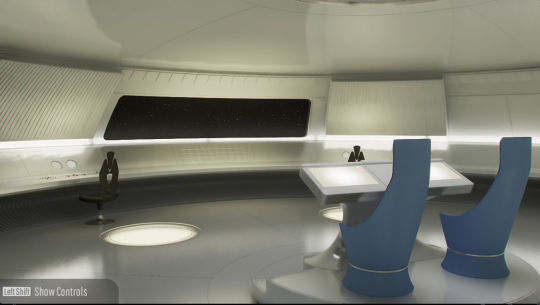
This is supposedly the launch configuration of the Prime universe U.S.S. Enterprise NCC-1701's main bridge. It's based on the first piece of concept art for the TOS set, and is one of several weird not-quite-canon things the Roddenberry Archive has decided to consider canonical. 2 command chairs and the whole centre console and chairs spins to face the very minimalist 60's scifi perimeter consoles or viewscreen. Try to imagine Captain April and first officer Chris Pike on this bridge, it's weird.
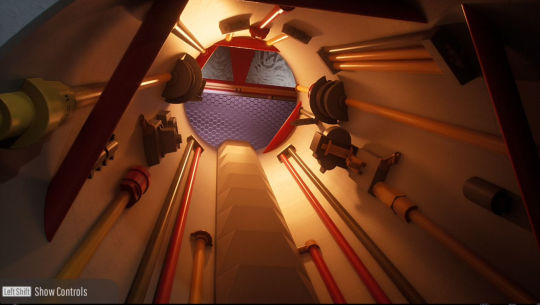
Behold! The top of the Jeffries Tube.
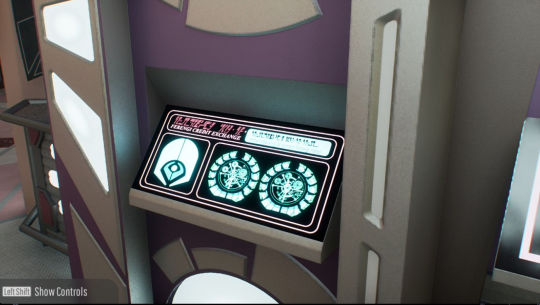
FERENGI ATM MACHINE ON THE PROMENADE!!!!
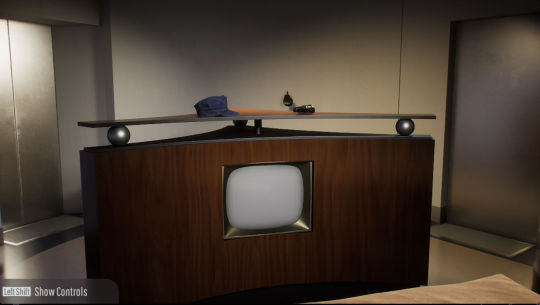
The view from OG Captain Pike's bed, featuring his awesome TV, his laser gun and his Starfleet hat. We wouldn't get hats back in Trek for 50 years.
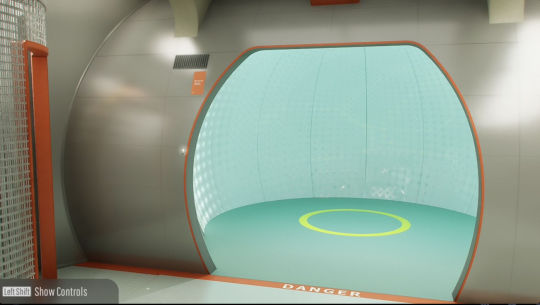
This is inside the Ringship Enterprise XCV-330, circa 2100. The Ringship in canon was seen only in picture form or a desktop model, we never saw inside. The ship was actually designed for a non-Trek Roddenberry scifi show called Starship which never came to be, and there was actually concept art made for the interior which the RA people decided to import to Trek too. Predating the transporter, here is the Metafier.
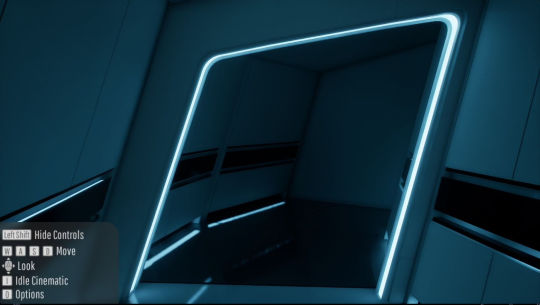
Discovery Season 2's U.S.S. Enterprise has a cool corridor running around it. Walk around it and... it goes nowhere😂 the Archive tries to balance the reality of everything being a television show with the fantasy of a 100% accurate in-universe museum, it'll give sets ceilings to make them into a believable spaceship but doesn't want to go nuts inventing too much of it's own stuff and that sometimes leads to weird stuff like this dead end
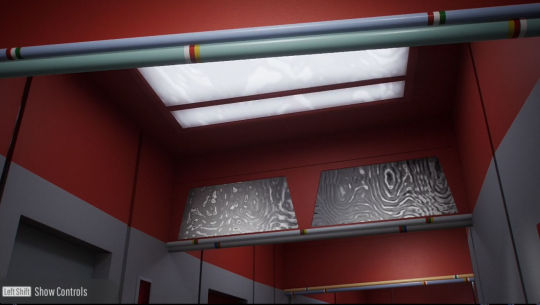
Speaking of ceilings, here's the ceiling and lights of the classic TOS Enterprise's corridors. I think they did a decent job keeping to the TOS aesthetic. The sets TOS was filmed on didn't have ceilings at all.
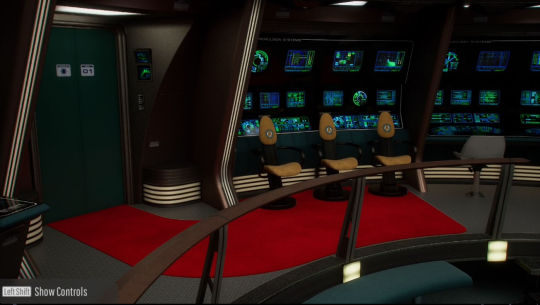
The Enterprise-B actually had a red carpet for special guests Kirk, Scotty and Chekov
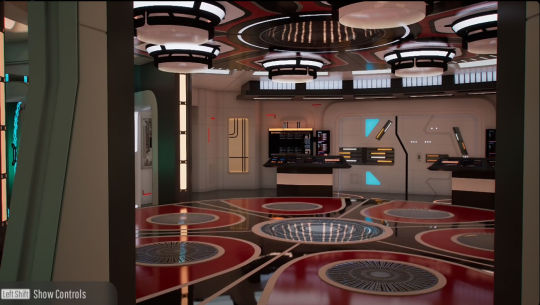
Strange New Worlds has the coolest transporter room of all. Just look at it😍
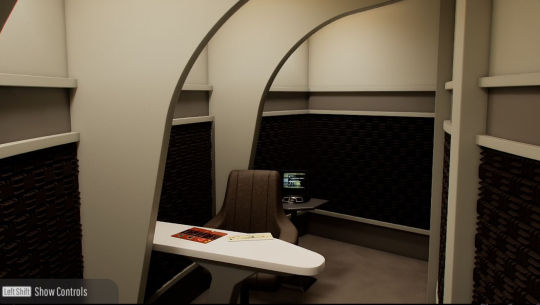
The TNG Enterprise battle bridge has it's own ready room! And it's super tiny, ultra cramped and Picard probably never used it because there's no replicator in there and thus no access to tea.
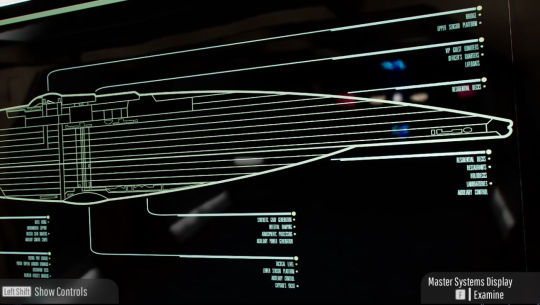
The 1st version of TNG engineering's big Master Systems Display as seen in "Encounter at Farpoint". Ten Forward wouldn't be a thing until season 2, and you can see here an earlier deck layout and the original concept for the saucer rim, a corridor walkway with windows above and below. You'll also note Ten Forward would actually be on deck 11 had they not changed the diagram by then.
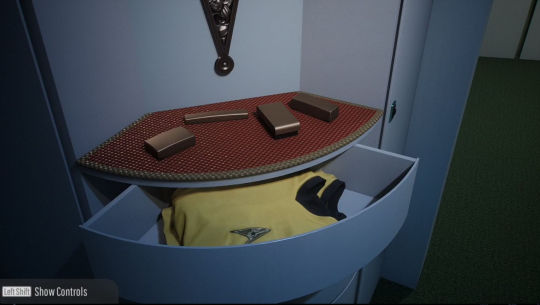
Kirk's quarters on the TOS Enterprise has dresser drawers full of uniforms for when his gets torn
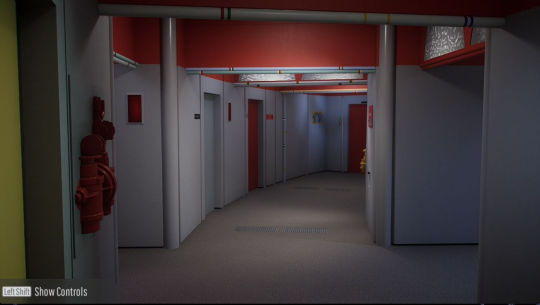
Walking around the Roddenberry Archive ships is eerie as hell. You're the only one on board, exploring corridors and poking your head into rooms. These starships are liminal spaces. This for me adds to the atmosphere greatly.
Here's the link (enjoy before it vanishes again!):
Roddenberry.x.io
Here's my original post about the Roddenberry Archive:
Also a clarification, I was wrong when I said it won't be in VR. There is one VR setup it was designed for - the $3,000 Apple Vision Pro. More details here, although it appears to only show a 2D window rather than be fully immersive 3D, possibly confirming what I was told previously that no current 3D setup is capable of doing a true VR experience:
#star trek#star trek the original series#tng#starship design#behind the scenes#roddenberry archive#deep dive#ringship enterprise#the next generation#strange new worlds#apple vision pro#uss enterprise#enterprise
208 notes
·
View notes
Text
Nalo Hopkinson’s “Blackheart Man”

I'm OFFLINE UNTIL MID-SEPTEMBER, but you can catch me in person at BURNING MAN! On TUESDAY (Aug 27) at 1PM, I'm giving a talk called "DISENSHITTIFY OR DIE!" at PALENQUE NORTE (7&E). On WEDNESDAY (Aug 28) at NOON, I'm doing a "Talking Caterpillar" Q&A at LIMINAL LABS (830&C).

In Blackheart Man, the new Nalo Hopkinson novel out today from Simon & Schuster, we get a tour-de-force from an author in full control of her prodigious powers: a story that will make you drunk on language, on worldbuilding, and on its roaring, relentless plot:
https://www.simonandschuster.com/books/Blackheart-Man/Nalo-Hopkinson/9781668005101
The action is set on Chynchin, a fantastic Caribbean island(or maybe Caribbeanesque – it's never clear whether this is some magical, imaginary world, or some distant future of our own). Chynchin is a multiracial, creole land with a richly realized gift economy that Hopkinson deftly rounds out with a cuisine, languages, and familial arrangements. Blackheart Man boasts some of the finest "in-cluing" (Jo Walton's marvelous term for the way that sf/f writers can assemble a world in their readers' minds with subtle clues that act as a made-to-be-solved puzzle the reader delights in assembling) you could ask for, and before you know it, you've completely internalized this world, with its racial politics, its cultural institutions (like the colloquium, where every scholar is also a musician and getting your doctorate requires scoring a book to be sung – and thus memorized and preserved by a choir of your fellow students), and its relationships (the stable configuration is a thruple, with most women married to two co-husbands).
Chynchin was founded through a slave rebellion, in which the press-ganged soldiers of the iron-fisted Ymisen empire were defeated by three witches who caused them to be engulfed in tar that they magicked into a liquid state just long enough to entomb them, then magicked back into solidity. For generations, the Ymisen have tolerated Chynchin's self-rule, but as the story opens, a Ymisen armada sails into Chynchin's port and a "trade envoy" announces that it's time for the Chynchin to "voluntarily" re-establish trade with the Ymisen.
The story that unfolds is a staple of sf and fantasy: the scrappy resistance mounted against the evil empire, and this familiar backdrop is a sturdy scaffold to support Hopkinson's dizzying, phantasmagoric tale of psychedelic magic, possessed children, military intrigue, musicianship and sexual entanglements.
Hopkinson's protagonist Veycosi is the kind of flawed hero whom you want to give a hug to half the time, and whose neck you want to wring. An aspiring scholar, Veycosi has the brash certainty of youth, convinced that he's the smartest (and sexiest) man in any room, and he's right just often enough to encourage him in a series of self-inflicted catastrophes that build to a terrible crescendo that sets up one of the most satisfying endings you could ask for.
Hopkinson – a SFWA Grand Master and Macarthur Genius Grant awardee – is justly famed as one of the field's great afrofuturist pioneers. Her prodigious talent has been obvious since her debut novel, Brown Girl In the Ring, and her career is an unbroken string of literary feats that went from strength to strength. I've known her since we were both teenagers working at the same library in suburban Toronto, and I never cease to be dazzled by her talent, her wit, and her warmth. But even by those high standards, Blackheart Man is a triumph.

On SEPTEMBER 24th, I'll be speaking IN PERSON at the BOSTON PUBLIC LIBRARY!!

If you'd like an essay-formatted version of this post to read or share, here's a link to it on pluralistic.net, my surveillance-free, ad-free, tracker-free blog:
https://pluralistic.net/2024/08/20/piche/#cynchin
51 notes
·
View notes
Text
these boots aren’t broken in and i feel like the guy from hellraiser who chose the liminal configuration
7 notes
·
View notes
Text
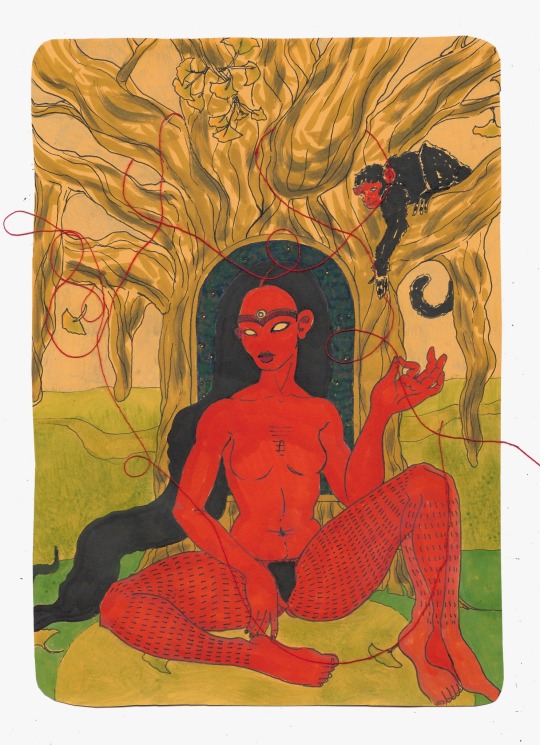
The Five Tenets of RAKALA
1. Embrace impermanence
"The universe is in motion, like a river forever flowing. Resist the current and you are sure to be overtaken by it. Instead, give yourself over. It is then that you become the river itself. It is then you understand what life is meant to be."
Accept that change is the fundamental nature of existence — its singular constant. Stability is illusion; true peace comes when impermanence is embraced. Learn to move as water or as wind, bending with ease over and around every obstacle.
2. Chaos is a friend, not an enemy
"Tell me: what is born from order? Order wants for nothing but what it has already so neatly arranged. Order looks at newness with suspicion. It must be categorized and yet, what then if it cannot be? It becomes a danger to the system, a threat, an enemy fit only for elimination. No, newness is borne not from order, but rather its opposite. Chaos delights in every novel configuration. It does not judge or even discern. In chaos, lives possibility in its most unadulterated form. Thus, if it is change you seek, you must learn to love it — that which is beyond comprehension."
Chaos must be embraced as the necessary precursor to growth and renewal. There is beauty in disorder and asymmetry. Every upheaval is an opportunity. One must learn to trust the process of transformation — even when the path is unclear, even when terror creeps in. If you have learned flexibility, then you have no need to fear.
3. Be rid of your chains
"The tyrant without is only a reflection of the tyrant within. You want freedom? Then be free. What's stopping you — all these precious illusions?"
Liberation begins with the self. Examine your fears, your doubts, your attachments, then break what mental and emotional chains bind you. Inner transformation is the foundation for outward action. Question everything, but do not stop moving. Wallow not in self-pity or the quagmire of your misdeeds, forgive and forge on.
4. Live in the liminal
"The threshold is where true power resides. Stand between worlds and you will see it all — every possibility like a thread, stretching on and on and on, crossing and criss-crossing. Which will you tug on?"
Inhabit the liminal — the moment of transition, the edge of consciousness, the border between order and chaos and order. It is there that RAKALA’s influence is most potent and where you might access her most profound insights. Go to the crossing and you will find her. Go to the crossing and you will find yourself and every possible version of yourself.
5. Love is a revolutionary thing
"Disregard all this talk of fate. You are not a puppet of the universe, you are its co-creator. We all are. So, take up your threads and weave something wonderful. Something revolutionary."
You possess the skill and the agency to shape your life and the world around you. Act with intention, using love as a force for disruption and transformation. Personal and collective liberation are intrinsically linked. Learn first how to free yourself and only then can you teach what freedom truly means. Dismantle systems of oppression and create space for growth. Find the still point in the eye and let creation flow through you.
3 notes
·
View notes
Text
I imagine Vox’s demonic form was made in a similar vain to the Cenobites and that…pleases me immensely.
Like, imagine Roland Voight from the 2022 Hellraiser movie (which works far too well, goddamn) and how he’s given the Liminal Configuration then how he’s turned into a Cenobite. That’s what I’m thinking, and I love that I’ve made this connection now actually.
#vox#hazbin hotel#the imagery fits#I need more horror in hazbin hotel and body horror fits perfectly#imagine waking up after your death and your body’s been mangled into something entirely foreign to you#hazbin hotel vox#hazbin vox#hazbin hotel idea#hazbin hotel thoughts#hazbin hotel headcanon#hazbin horror; my beloved#ima+fi#me•#i speak bitches *mwah*#🖤
11 notes
·
View notes
Text
Added a few new touches to the Horror props. DIY'ed the hooks and chains coming out of the Hellraiser cube. Added a few alien artifacts including the Dead Space Marker, the Alien skulls and the Alien Hellraiser cube (with Zombie hand). Last, but not least, the Lemarchand Planchette for the Ouija Board.
Hope you enjoy fellow horror fiends.










#hellraiser#horror#alien franchise#aliens#dead space#marker#alien skull#ouija planchette#ouija board#zombies#severed hand#hellbound hellraiser 2#cenobite#pinhead#hellbound#lemarchand configuration#hellbound heart#clive barker#hellraiser franchise#hellraiser 2022#dead space downfall#dead space aftermath#lazarus configuration#lore configuration#laudarant configuration#liminal configuration#leviathan configuration#lament configuration#hellraiser configurations#alien romulus
11 notes
·
View notes
Text
It is in the silence I find you. Tucked into my bed wrapped and draped in velveteen I nestle somewhere warm, somewhere soft, And I close my eyes and imagine us one last time. Flashes of neurons flutter behind my eyes green and blue streams and shapes of light seep into negative space configuring something new, make matter into energy. What is my body without you? I struggle to exist in a space so liminal. My ears melt into the memories as my mind twists, and my heart slows reconfiguring a new story. I breathe shakily (even in rest I tremble) trying to come up for air as you swallow my body whole once again. I awaken desperate to hear you.
5 notes
·
View notes
Text
Analog horror in a haunted bowling alley
I've been kicking around the idea of creating a module for Liminal Horror or FIST ULTRA loosely based on an abandoned bowling alley I spent a few weekends in as a preteen.
Background:
My dad and grandfather were hired to tear up the lanes in a long-abandoned bowling alley that my father frequented as a child. In the dead of winter, it wasn't uncommon for us to hear someone rushing out the rear entrance as we shook snow off our boots in the lobby. I got terribly sick out there, spending most days bundled up next to a generator and some work lights while the lanes were pulled up with crowbars. My dad insisted I was totally fine. Other times, I wandered behind the lanes and into rows of shelves packed with dusty prizes and trophies rearranged in new, fever-dream-esque configurations each time we checked in. It sat alone on an otherwise vacant lot and in all honesty looked pretty similar to the building depicted in the FNAF movie.
Key features:
A doomsday cult infiltrating a bowling league; a newly promoted supervisor in over his head.
A forgotten network of tunnels connecting the complex; a security system in permanent lockdown.
A dormant horror planning its escape.
2 notes
·
View notes
Text
Mélusine: The Shattered Mirror of Desire and Dissonance
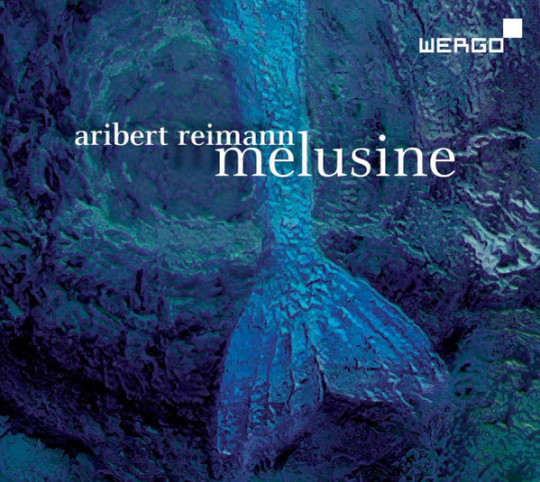
I. The Music of Fractured Realities: A Deep Musical Structure Analysis
Aribert Reimann’s Mélusine is a sonic labyrinth—rigorously structured, violently expressive, and often perilously close to collapse. Composed in 1971, the opera is steeped in the post-Webernian serialist tradition, yet Reimann pushes beyond its constraints to craft a musical language of psychological fluidity and mythic unrest. At the core of Mélusine lies a dual commitment: to structural precision and to emotional rupture.
Twelve-Tone and Pitch Organization
Though Mélusine is not a strictly twelve-tone opera in the Schoenbergian sense, it draws heavily from serial principles. Reimann’s pitch organization often involves cellular motivic groups—three- to five-note cells derived from original pitch-class sets that are then manipulated through transposition, inversion, and retrograde. He avoids full twelve-tone rows, instead favoring segmented combinatoriality, wherein individual pitch cells are expanded or compressed across registers to create a sense of harmonic non-linearity.
A recurring cell throughout the opera contains the pitch-class set (0, 1, 4, 6), a highly dissonant configuration that embodies tension and unresolution. This cell recurs in various permutations in Mélusine’s vocal lines and the orchestral interludes, often stretched across several octaves or layered in canonic imitation.
Orchestration as Psychological Space
Reimann’s orchestration is deeply coloristic, using instrumental timbre as a form of narrative expression. The woodwind writing, for example, often employs extended techniques: multiphonics in clarinets, flutter-tonguing in flutes, and key slaps to emphasize fragility and otherworldliness. Mélusine’s voice is frequently doubled—delicately and briefly—by celesta or high strings, suggesting her ethereal, liminal identity.
The string section uses extensive sul ponticello and col legno battuto techniques, creating an eerie texture that sometimes resembles electroacoustic manipulation. There is frequent use of microtonality, particularly in the solo string parts—quarter-tone glissandi that give the impression of pitch instability, further emphasizing Mélusine’s unstable identity and the opera’s hallucinatory logic.
Reimann frequently assigns instrumental groupings to represent different narrative spheres. For instance:
Mélusine’s mythic realm is colored with harp, celesta, high woodwinds, and gossamer strings.
The “human” realm—her lover and the court—is more solidly orchestrated, using brass chorales and thicker textures.
Moments of rupture often involve clashing instrumental layers with opposing tempi, such as asynchronous tremoli in strings against violent, rhythmically free brass stabs.
Temporal and Rhythmic Displacement
Reimann manipulates time by subverting rhythmic expectations. The score makes heavy use of irrational time signatures (5/10, 7/16, etc.), which distort the perception of pulse. Mixed meter passages are frequent, and rhythmic gestures often begin in unison before diverging metrically—creating the effect of cohesion unraveling in real time.
There is a strategic use of metric phasing and polyrhythms, especially in scenes of emotional tension. For example, Mélusine’s aria in the second act features a notated tempo of ♩ = 76 in the orchestra, while her vocal line floats over it at a free, speech-like pace—frequently marked quasi parlando, with approximate rhythmic values. This detachment between voice and ensemble heightens the impression of inner fragmentation.
Additionally, Reimann incorporates aleatoric elements. In several orchestral tuttis, performers are given temporal cells to repeat ad libitum within a conductor-defined time window, creating a cloud-like texture of clashing gestures—symbolic of Mélusine’s increasingly disintegrating psychic state.
Harmonic Language and Intervallic Identity
Reimann’s harmonic palette is primarily intervallic, defined more by tension between intervals than by root movement. Tritones, minor ninths, and major sevenths dominate the vertical sonorities—intervals traditionally associated with instability and dissonance. The harmonic motion is frequently non-functional: chords are not cadentially linked but juxtaposed by intervallic contrast.
Rather than using leitmotifs in a traditional Wagnerian sense, Reimann structures identity around intervallic fields. Mélusine’s “sound world” is saturated with minor seconds and augmented fourths, which recur whenever she appears. In contrast, her lover is often associated with consonant dyads (perfect fifths, thirds) that dissolve or are subverted when the two interact—reflecting the impossibility of synthesis between their worlds.
One of the most arresting moments of harmonic structure occurs in the transition between Acts I and II, where Reimann stacks multiple tritone-based sonorities in the brass and low woodwinds, creating a densely saturated harmonic field—a psychological barrier the characters are unable to cross without catastrophe.
Text-Music Relationship
Reimann treats the libretto, adapted from Yvan Goll’s poetic text, not as a narrative but as a phonetic and symbolic source. He often assigns musical gestures to phonemes or syllabic contours. For example, the vowel “i” in Mélusine’s name is typically rendered with high-register pitches and narrow intervals (minor seconds, major sevenths), emphasizing fragility and brightness. Conversely, harder consonants such as “k” or “t” in the lover’s lines are accompanied by staccato attacks in percussion and low brass.
Syllables are often fragmented across rhythmic cells, with textual meaning deferred or obscured—mirroring the opera’s broader themes of deception, concealment, and revelation.
II. Romance Beneath the Surface: The Tragic Poetics of Mélusine
At its heart, Mélusine is a meditation on love as transformation—and destruction. The tale of Mélusine has long haunted European folklore: a water spirit who marries a mortal man under the condition that he never look upon her during certain times, lest he uncover her serpentine nature. In Reimann’s adaptation, this myth is transposed into a fractured modernist tragedy, where love becomes impossible within the confines of human and mythic boundaries.
Mélusine is not merely a seductress. She is an existential archetype: the Other, the Unknowable. Her allure is tied not to carnality but to mystery—to the invitation she offers into a world beyond comprehension. Her husband, driven by both desire and the patriarchal compulsion to know and control, ultimately violates the fragile trust that sustains their bond.
The romantic dimension of Mélusine is thus defined by secrecy and rupture. There is tenderness—Reimann allows occasional diatonic fragments to emerge in moments of shared vulnerability—but these are quickly swallowed by the abyss of distrust and revelation. The more the mortal lover seeks to possess or understand her, the more he alienates himself from her.
What makes this romance so compelling is its refusal of resolution. Love does not redeem; it reveals the irreconcilable chasm between souls. Mélusine’s ultimate withdrawal is not a punishment but a release—her return to water symbolizing a liberation from the prison of human expectation. The opera closes not with a dramatic climax but with an unraveling—music dissipating like mist, as if the entire opera had only been a dream recalled too late.
In this sense, the romance of Mélusine is tragically modern. It acknowledges that intimacy may always be laced with destruction, that to love truly may mean to accept the unknowable rather than to conquer it. It is the death of Romanticism as much as it is a post-Freudian fairytale.
III. Legacy and Resonance: A Mirror in the Present
Mélusine remains on the periphery of the operatic repertoire. Its demands—technical, psychological, and emotional—are immense. It lacks the commercial appeal of tonality, the narrative clarity of traditional libretti, and the melodic accessibility many audiences still seek. And yet, its legacy is growing quietly, its influence reverberating through contemporary compositions and productions that favor psychological interiority over grand spectacle.
In the #MeToo era, Mélusine has gained a new interpretive lens. The opera’s exploration of a woman punished for her secrecy, for her difference, reads as a powerful indictment of the male gaze and the violent consequences of voyeurism. Productions now often frame Mélusine not as monstrous, but as a symbol of feminine agency, misunderstood and betrayed by the structures around her.
Musically, Reimann’s influence is evident in the works of composers like Olga Neuwirth, Chaya Czernowin, and Beat Furrer, who similarly dissolve boundaries between speech and song, between harmony and noise, between body and psyche. Mélusine's structural innovations—its fluid orchestration, its temporal ambiguity, its use of mirror forms—continue to inspire new approaches to musical drama.
Moreover, the opera’s mythic core—its portrayal of love as a destructive revelation—has become increasingly resonant in an age where identity, privacy, and intimacy are constantly negotiated through digital mirrors. Mélusine, the woman who cannot be seen fully without vanishing, speaks poignantly to our time, when the very act of exposure often leads to obliteration.
In the end, Mélusine is not an opera to be understood in full. Like its heroine, it resists possession. It is a work to be entered, drowned in, and perhaps never entirely returned from. In that way, it stands as one of the most haunting, underappreciated masterpieces of 20th-century opera—a watery mirror held up to the self, both alluring and terrifying in what it reflects.
0 notes
Text
the purgatory papers | introduction: part two

"enter.. we have much to discuss."
minors dni. ageless blogs dni. blank blogs dni. you'll be blocked. <- part one | main masterlist | part three -> character(s): gn!reader, kim hongjoong, choi san, park seonghwa, kang yeosang; (minatozaki sana, myoui mina;) tags: explicit language, light banter, slight hostility, alcohol, references to drinking alcohol to cope word count: 5.1k summary: with only a vague idea of what lies ahead of you, you take a trip to both hell and heaven to speak with the people involved. in doing so, you start to get a glimpse of just what exactly you're dealing with.. a/n: i initially intended to this just be one long introductory chapter, but i'm actually gonna split this into three parts because this second part ended up way longer than i thought it was going to;😭 i hope you enjoy!

The road to hell is paved with good intentions.
You give the mortal world exceedingly less credit than the folks in Heaven would, but it’s not lost on you that the configuration of Heaven, Hell and purgatory are exactly how they’ve envisioned it for thousands of years. For the nth time it makes you chuckle as you descend the staircase into the cavernous pit, recalling how you once joked with Yunho that the mortal world is basically the living room, and that they would sometimes refer to Heaven and Hell as upstairs and downstairs respectively.
One thing that is slightly off is that purgatory still, in part, exists as a liminal space above the sphere as well as below it. The area in which you live means you often refer to it as downstairs.
As for Hell, that’s the basement.
And much like the mortals, no trip to the basement is a fun one.
The temperature is known to increase, but you yourself don’t feel it much, bar the odd sweat beads that form across your hairline. As you approach the door to Hell, the air does become noticeably stuffy, and you wonder if they upped the fire resources in the last century and why exactly they felt the need to bask in more heat than necessary.
Then you recall how the temperature is governed by the overseer’s temper - hence temperature - and it all starts to make sense.
Old Horns’ feathers have been ruffled in greatly unfortunate ways.
There’s a single security guard standing by the door to Hell, someone you’ve strangely become good friends with since you first met two centuries ago. Her eyes light up at your arrival, and her smile invites you to smile back. However reluctant you felt to take on this job, it’s always nice to see her again.
“Well, well, look who it is!” she teases. Embers of orange dance around the curls of her auburn hair, her black, backless dress trailing the floor. “Never one to stay a stranger, hey?” She smirks, knowing full well why you’re here, but opting not to say the quiet part out loud.
“Business as usual,” you nod, then exhale deeply, “for the last time.”
Sana’s face falls instantly. You didn’t think such an expression would sting so much. “Oh. So, that means you won’t be paying any more visits to Hell.” She says it so matter-of-factly, as if she already understands how this is going to work, but there’s still a tinge of sadness in her voice. It makes you feel genuinely awful.
“Well-” You trip over your words in an attempt to placate her. “Not necessarily!” you perk up. “I can still pay you a visit!” you say. Sana grins again, so bright and effervescent. It actually brings you joy to cheer her up about this. A strong heart lies dormant in your dwelling soul after all. “And besides, no more business means I’ll have more free time.”
“We can do the stairwell picnic we talked about!”
Ah, the stairwell picnic. Meet halfway along the staircase and eat snacks while waxing philosophical about the mortal world.
You smile. “Yeah, I’d like that.”
Sana claps her hands excitedly. “Excellent! Well- ahem- enough chit-chat.” She opens the door to Hell. “Welcome to the fire!”
“Speaking of that,” you mutter into her ear as you walk past, “have you noticed that it’s warmer down here? If I’ve noticed, then you’ve surely noticed.”
Sana coughs weakly, trying to ignore what is so clearly a bothersome elephant. “Well.. Um, yeah, to be honest, it’s not really my place to make a comment,” she whispers in response. “But.. it is.” She seriously lowers her tone for that last part. You swallow the lump in your throat and nod. Sana’s smile then returns and she almost nudges you into Hell. “Have fun!”
The door shuts behind you, and the noise is thunderous. Most of the residents here turn to see you, and they hone their eyes at your presence.
You’re not their favourite member of the band.
Without a second to waste, you depart for the corridor to Hongjoong’s office.
Not a single eye leaves you as you speed down the narrow halls of the overseer’s domain. Many of them begin to chat among themselves; you know they’re talking about you.
The two guards outside Hongjoong’s door straighten their backs as you draw near. One holds up their hand and speaks in a low, harsh voice. “Excuse me, this area is out of bounds.”
“I have express permission from Hongjoong himself to speak with him.”
The guards exchange looks. They turn back to you, and the other speaks, his voice rougher than the first. “Is that so? Do you have any identification to prove this?”
“I have this red card,” you announce, pulling the item out of your inside jacket pocket. You hand it to the first guard, and they both inspect it diligently, before bursting into laughter.
“Nice try, but this is, for lack of a better word, bullshit,” chides the second guard. He evaporates the card with a single toss in the air.
You groan internally and try again, “Listen, I know this is completely unheard of, but Kim Hongjoong has specifically asked for me to speak with him on a very important matter.”
The first guard stutters over his laughter, “What? You’re joking, right? The High Devil doesn’t speak to anyone unless he has given the word.”
“Yeah, if he wanted to speak to you, he would’ve informed us,” says the second guard.
“If that is the elder of purgatory, let them in.”
The sound resonates through the door, startling the three of you.
“Uh-”
“Um-”
“But- But Your Highness-”
“Did they present you with a red card?”
The guards eye one another. You lift a brow at them as if to say, see, what did I tell you?
In an instant, the second guard restores the item to its former glory and hands it over to you with a mouthed apology. You take it with a shameful shake of the head and fold your arms.
“Um, yes, Your Highness, they did.”
A beat passes, and the door opens, seemingly by itself. The two men part in the centre and stare straight ahead, assuming a stoic position despite the dread coursing through their veins.
“Enter, N. We have much to discuss.”
You take a deep breath in and let go. With your shoulders pushed back, you pass by the guards and enter the office of Hell’s overseer.
The second you’re through the door, it slams shut behind you, making you jump. You place a hand on your chest - a habit you picked up from the many times you’ve manifested, mortals seemed to do that when something surprised them - and exhale through your nose.
Ahead of you, the High Devil paces back and forth in front of his desk.
You take a moment to have a good look at the place. It’s the first time you’ve set foot in this room. The ceilings are so high you can’t see where they end, but the room itself is surprisingly small for such a figure like Old Horns.
The walls are draped with burgundy curtains and there are candles everywhere. To most people, this room would be unbelievably dark, but you are able to see Hongjoong very clearly. His desk almost takes up the total width of the room and seems to be carved from mahogany or oak.
You clear your throat quietly and remind yourself that you’re not here to admire his decor.
Hongjoong stops when he notices you. “Ah.” He quickly disappears in a cloud of smoke beneath the desk then reappears on the other side, already sitting in his chair, a motion that doesn’t phase you. “Take a seat.”
There’s a passive sense of magnitude inside you; this is the first time you’ve ever met Hongjoong, the first time you’ve ever stepped into his office, something strictly forbidden unless he specifically requests it. Over the course of the three millennia that you’ve spent in purgatory, that occasion is so rare that you notice three distinct plaques affixed to the wall behind him denoting these moments as some sort of achievements.
You assume this meeting will add a fourth to that collection.
Eventually, you take a seat opposite and slowly descend into the chair. Perhaps that feeling isn’t so passive after all.
Everything that you’ve understood about Hongjoong over the centuries is now taking full effect right in front of you. He doesn’t make eye contact, doesn’t seem particularly pleased with social interaction, and the embers don’t so much dance around his hair as they do shift erratically around his entire form.
Neither of you speak for a time. What do you say? Do you even say anything at all? Yunho hadn’t exactly debriefed you on the appropriate etiquette for talking to the High Devil.
Uncomfortable silence spreads through the whole room until eventually, Hongjoong shifts his gaze to the side and speaks. “I am sure you understand why I have asked you to come here.”
Understand is probably not the word you’d go for, but for the purposes of getting this over and done with you agree. “Yes.”
“Good. Because as you can probably tell, I am up to my fu- God- .. neck in it.”
You blink a couple of times. Old Horns not being partial to the odd cuss? Colour yourself shocked.
You spare him any quippy remarks, you’ve never met the man before, after all, and instead simply say, “..Yes.”
“This feud, this-” He tries stalling his anger by clenching a fist and resting his lips against it. “I’ve been Hell’s overseer for thousands of years. I’ve seen things come out of this amorphous realm that I couldn’t begin to describe to you. But this?”
“Somehow worse than that?” you stutter, nervous even still of stepping a single syllable out of line.
He swallows. He breathes out. He looks up at you.
Kim Hongjoong looks up at you.
Your entire being turns to stone as he maintains eye contact with you.
“It’s a level of spite and vitriol that I can’t possibly comprehend.”
Your resolve shatters. This all makes sense. Of course Hongjoong has seen shit that no one else has ever seen, he’s the goddamn leader of Hell.
But this.. this is something he can’t comprehend.
And it’s your job to cipher an explanation. It’s your job to help Hongjoong understand.
He’s typically never cared for the feuds. Anything that goes on between the residents of Heaven and Hell has nothing to do with him.
But now he is directly involved.
And for whatever reason, this has stoked a fire so strong it’s caused him to increase the temperature.
You brave a question that’s been on the tip of your tongue for the last minute or so. “What is it about this animosity that you cannot comprehend?”
Hongjoong leans forward, not breaking eye contact with you for a second.
“Why the elder in question didn’t take things up with Seonghwa while he had the chance.”
Seonghwa. The de-facto leader of Heaven.
Why for the love of all that is good is Seonghwa involved?
You hold back on making a comment but your face says it all. Hongjoong scoffs, “Yeah. I know. Trust me, getting in touch with him was not on my to-do list.”
“You- You got in touch with him?” you hesitate to say. Hongjoong nods solemnly.
Why didn’t Yunho mention this? Did he even know?
You chew the insides of your bottom lip and ponder for a while; Yunho and Seonghwa have never met.
But if this is as big and as serious as Yunho said it is, as Hongjoong is currently claiming it is, to the point Seonghwa of all people is in the know, then why were you not informed?
Why didn’t Seonghwa tell you?
You and Seonghwa had been friends for quite a while, ever since you were merely a dweller. He had not long become the leader of Heaven, though Heaven never really had a leader. It was simply a placeholder title, the illusion of someone with authority beyond the pearly gates, but Seonghwa doesn’t rule in the way Hongjoong does. He mainly acts as a figure of guidance, a literal guardian angel as the other residents had joked. Heaven did have space for a sense of humour.
Given your history, it feels like something Seonghwa would have relayed to you during your monthly catch-ups. Heck, your last catch-up was only a fortnight ago, so is this an incredibly recent thing? Could he not have sent a message, was the information too confidential to risk a telegram?
There’s a flood of questions drowning every cell in your brain to the point it almost leaks out of your ears. You grip the rests of the chair until your fingers hurt, which to your surprise, concerns Hongjoong.
“Um, N? Is there something on your mind?”
You gaze up at him, foregoing any distant regret at the act. “Seonghwa never told me.” Hongjoong sits back in his chair. “I feel like- y’know you’re probably not aware of this, but, we’ve been friends for a while-”
“I am aware,” he reveals, “Seonghwa actually conceded that I ask after you in order to sort this situation out.”
You let go of the arm rests and place both hands on the desk. It’s cold to the touch, remarkable for such a sweltering space. “Y’know, not to make this about me, I just.. It’s weird, y’know, unless this happened in the last week, then I guess that makes sense, but-” Hongjoong’s words finally register. “He- He said what?”
Hongjoong sighs. “Seonghwa conceded that we ask after you. Full disclosure, this has been going on for a while, but it only really came to a head in the last week or so. He confided in me that he has been going back and forth in his brain over whether or not to send you a message himself, but that changed when I knocked on his door.”
Sparks are firing off every inch of your body. The room is suddenly much hotter, and your nerves are somehow flying through the very tall roof of this office.
“I- Fucking hell-”
A hand flies to your mouth. Lower-case hell, and yet, it still stings on your tongue when you remember where you are.
Hongjoong shrugs it off, even managing to crack a smile. “Honestly, N, that does not phase me one bit.”
Your hand falls. “I- ahem- I’m sorry.”
“Worry not, N. I hear that sentiment all the time down here.”
The conversation has become calm out of nowhere. For a small moment, you forget yourself, but you immediately spring back when the embers return and Hongjoong’s eyes harden.
“Trust me, this situation is relentless on all fronts. I have an elder stewing in his own hatred and guilt, and there’s an angel upstairs he’s got it in for.”
“And you need me to scope this out?”
Hongjoong looks at you. “Yes. Please. If you would be the kindest.”
Taking a deep breath, you rest your forearms back on the desk. “Okay. Give me the details, and I’ll pay a visit to Heaven and talk to Seonghwa.”
“Good idea.” Hongjoong clicks his fingers once and a sheet of paper appears between his thumb and forefinger. “Here’s all the information you’ll need. I know that Yunho didn’t give you much, but that’s because I had all of it.”
You glance at the paperwork. At the very top, you see two names.
Choi San and Kang Yeosang
Choi San being the devil. Kang Yeosang being the angel.
Reading through the paperwork is an absolute trip. It’s all still so vague and yet you have your work cut out for you.
San - Elder. Four millennia. Mysterious past - possible connection to Heaven? Long history with Kang Yeosang. Seonghwa knows him of old, but the two never got along. San was never an angel, but has a history with Heaven. Yeosang - Divine. Two millennia. Harbouring a secret that no one in Heaven knows, not even Seonghwa. hates San with a burning passion. The facts - San and Yeosang have a long history. There are connections between the two of them via Heaven and Hell, but they have no connection to purgatory. Only they know why they feel the way they do, except Seonghwa has a theory that either one of them used to be residents of the other. The questions - Why didn’t San tell Seonghwa about this situation? What is the history that connects San to heaven, despite him never being an angel? Was Yeosang once a devil? Was San the reason he left Hell, or was Yeosang the reason San left Heaven? What do the other residents know of their history? Is there anything that San’s closest friend in Hell, Jung Wooyoung, can tell us about their past? Why has their feud caused such a terrible rift?
Your brows knit at a name you don’t recognise. “Jung Wooyoung?”
Hongjoong scoffs the meekest smile. “Ah, Wooyoung. The true definition of a daredevil. He has been here for two millennia, good friend of San. He likes to manifest to the mortal world a lot, so he doesn’t often spend time in Hell.”
You tilt your head. Interesting.
Hongjoong senses your gears turning and explains further, “I only added that question because something tells me he might know something. I mean, the two of them clicked almost immediately when they first met. Wooyoung had been there for a few centuries by that time. San was in a bit of a mortal world phase so he wasn’t around when Wooyoung first arrived.”
As Hongjoong speaks, you store all the necessary mental notes and remind yourself to jot them down in your notebook once you’re back.
“I see. Thank you for letting me know.”
Hongjoongs nods once, very politely, then shuffles the remaining papers in front of him. “So, with that, I believe that concludes our meeting. Do you have any questions?”
Yes, and no.
“I don’t think so,” you tell a half-truth. Or is it closer to a lie? You’re not sure.
“Well, if anything changes, send a telegram through Yunho and I will reply as promptly as possible.”
“But what if by that point I’ve manifested to the mortal world?”
Hongjoong hums, then strokes his chin. “Good point.” He then smirks a little. “In that case, do it the old-fashioned way.”
You make a face you can hardly believe you’re making in the presence of the High Devil, and he laughs, though it comes out as more of a heavy rumble. “Nobody has done that for hundreds of years.”
“Well then, perhaps you can start a new wave.”
You stand up, take the piece of paper, then fold it before putting it in your jacket pocket. “It has been quite the bizarre honour to speak with you, Your Highness.”
You can’t exactly say the meeting was amicable, but it certainly wasn’t hostile either.
Hongjoong regards you reverently. “And I you, N. Take care, and make yourself scarce.”
Exactly what Yunho had said. Not quite two peas in a pod, but close enough.
Upon leaving the office, you bypass the two guards with ease and make your way to the entrance.
That is until you are stopped by one of the devils.
“Excuse me, what were you doing speaking to the High Devil himself?”
You glance at the devil. His short, black hair is swept back off his forehead and stiff, as though held back in place with gel. You know of mortals styling their hair in various ways. Perhaps this is a look this devil picked up from one of his visits. “The meeting between us is strictly confidential, now please excuse me.”
You skirt around him and head for the door. He turns in place and yells after you, “Hey! We know why you’re here, don’t pretend like we don’t. We’re not fucking stupid, y’know.”
“San..” you hear another mutter.
San.
Shit, that’s San?
If you make your business known, he will know it’s him you’re getting the scoop on.
“You’re just here to get another article in your miserable paper. Haven’t you had enough of that?” he chides.
You swallow the lump in your throat and leave, not even sparing Sana a glance, regrettably so. Sana watches you ascend the stairs, and the door to Hell closes behind you.
Halfway up, you reach the doors of purgatory, your proverbial home, and take a few deep breaths.
Nothing has ever left you feeling so stilted. Residents of purgatory have no room for such strong emotions, and being an elder yourself, it’s astonishing that a split second confrontation with another elder has left you more winded than an entire meeting with Hell’s overseer.
His words turn somersaults in your mind as you continue your journey up to Heaven. All the while, you wonder if talking to Seonghwa will calm you down, you are friends after all, but then you remember his involvement in this feud.
And by the time you get to Heaven, the familiar face you’ve come to know as Mina, who much like Sana, acts as a security guard to the gates, is full of thunder in a way you have never witnessed before.
“Mina..” you inaudibly breathe out.
“N, good gracious, am I ever pleased to see you.” She approaches you and immediately wraps her arms around your shoulders, a gesture uncommon for her, and you awkwardly return the hug before she pulls back. She grabs your arms and looks you dead in the eyes, “N, there is no polite way for me to say this, but Seonghwa is beyond inconsolable.”
You sigh deeply and look askance. “Don’t worry, I have some idea.”
“I thought you might,” she replies, letting go of your arms. “You have the face of someone who’s called at Hell already and hasn’t had the best experience.”
“You would be shocked to understand why.” Mina flexes a brow. “My meeting with the High Devil went pretty smoothly, actually,” - Mina then lifts both brows in shock - “I know. It was what happened after that that caused this.” You gesture vaguely to yourself and Mina exhales sympathetically.
“Oh dear. Did someone make a pointed remark?”
“Only one half of the party involved, no big deal,” you shrug it off sardonically, and Mina’s head falls in her hands. “The silver lining is that I don’t think he recognised that what I’m helping out with concerns him, so I think I’ve bought myself some time.”
“Any time is better than none,” Mina concedes. “But it is also of the essence, specifically in regards to Seonghwa.”
You glance at her, “Do you know the full extent of what’s going on?”
“Goodness, no. Not my business, not my place to ask. But I just know it’s another disagreement, and this one is so bad it’s made him so upset to the point I’ve been dragged into calming him down.”
You reach for her hands, tucking them into your own. “You have my sincerest apologies, Mina. I’ll see what I can do.”
“Worry not, dear, it is out of your control. I just hope things clear up eventually.”
“So do I. Okay, let’s go find Mr. Sad Wings.”
Mina stifles a laugh with a shake of the head, then hesitantly opens the door to Heaven.
You create a shield over your eyes with your hand; how do you constantly forget how bright it is in Heaven?
From afar, you notice a swath of angels surrounding a boldly disgruntled figure, fanning his face with their own wings and replenishing his cup with a dark red liquid.
You stop in place and cock a brow. Trust Seonghwa to unleash his inner amateur dramatics.
Seonghwa then notices you, and within seconds tells every angel to flee his presence. “Ah! N! Precious N, my dearest friend, how pleased I am to see you, my goodness.”
“Seonghwa,” you bluntly reply, dissatisfied with the performance.
He notices this and places a hand on his chest, genuinely offended by your attitude. “N! Can you not see I am in the greatest distress?”
“I can see you’re donning your I wish I was on Broadway slacks again.”
Seonghwa instantly halts the act and glares at you. “Fine.” He stands up, sets the cup aside and walks towards you. “You’re here, finally.”
“Finally?” you utter, taken aback.
Exasperated, Seonghwa exhales deliberately. “Listen, N, I am truly sorry, but the past 48 hours have been an absolute nightmare.”
“I can see, I can tell, and I know. You don’t have to say anything to me I haven’t already heard from Old Horns.”
He blinks at you. “Wait, you mean to tell me you went there first?”
You shrug, “Thought I’d get it out of the way, and honestly I’m glad, he was the one that ended up telling me about your involvement in this mess.”
He reflexively closes his eyes with yet another frustrated sigh. “Do not get me started, I have not caught a break from this since all- of it started breaking loose.”
Folding your arms, you shift to the side. “So much so Hongjoong had to get in touch?”
Seonghwa’s eyes open and he stares at you. “He told you that too?”
“Of course he did, Seonghwa. Hongjoong filled me in on everything he felt I needed to know, including this..” You pat the left side of your jacket discreetly, alluding to the information within, and Seonghwa pushes his shoulders back nervously. “You know me, I’ve been quite successful at my job, and if it means managing to help both leaders of Heaven and Hell at once, I consider it a bonus.”
“Hey! I am not the leader, you know how I feel about that.”
“De-facto leader.”
“Not even that! I don’t like being associated with the term, it makes me feel like a deity.” He adjusts his outfit, closing in on himself more as he stares at the cloudiness that covers his feet.
“Well, how should I refer to you if not by your name?”
“As I always have since I became an elder: an elder.” Seonghwa looks about the place then back at you. “Everyone here calls me a leader, it’s unnerving.” He shivers in the place at the mere thought then exhales. “So, you have all the information you need, you know exactly what you’re dealing with, why exactly have you come to see me?” he asks.
“Oh, am I not allowed to see you anymore?” you tease lightheartedly. Seonghwa rolls his eyes at your comment and explains that it isn’t about that, but that maybe you wouldn’t want to loiter around considering the sincerity of the situation. You ponder this and concede his viewpoint, but then you remember the feelings laying in the far back of your mind and scratch the nape of your neck. Honesty is the best policy. “Well, to be frank, when Hongjoong told me that you were a part of this, I wondered why you hadn’t said anything to me.” Seonghwa listens, but looks at the floor almost shamefully. “I just.. It just seemed a bit weird, since we’ve known each other so long and we talk about basically everything.”
“I see where you’re coming from,” Seonghwa replies, eventually gazing up at you. “It was never my intention to withhold anything from you, there was no malicious foresight.” You didn’t think there was, but continue to listen anyway. “I suppose I didn’t say anything right away because I just knew this would result in something that you’d be asked to get the answers on in a professional manner.”
“So it didn’t feel right to confront me on a personal basis?”
“Exactly.”
You hum in understanding. “Makes sense.”
“Trust me, N, this is well beyond both mine and Hongjoong’s imagination. I reckon it was quite odd for Yunho to discover as well.”
This takes you aback. Seonghwa rarely, if ever, references your boss directly, much less so by name.
You bite your tongue and decide not to dwell on it. “Oh, trust me, he was as shocked as anything.”
Seonghwa nods knowingly. “Well, to be honest, that is all I really understand about the situation. Anything you could possibly glean from my knowledge is contained in that paperwork, I can guarantee it.” He indicates your jacket pocket then clasps a hand over the other wrist, settling it on his abdomen. “I wish you the best of luck on his endeavour, and for the good of all that is gracious, don’t cross any wires.”
You lift a brow. “Meaning?”
Seonghwa goes to turn his back in a very defensive fashion. “Once you start divulging, it will all make sense.” Without another word, he walks away from you, lifting his cup and taking a sip of the wine within.
You feel the most bizarre interaction you’ve ever had with your closest friend has come to a rather unnatural conclusion, and instead of saying goodbye, you simply bow your head and turn to exit Heaven.
Before you can reach the gates, however, Seonghwa has another message for you.
“Be careful on the way down. It’s risky business.”
You stop in place. The same thing he always says before you go on a new adventure.
A smile cracks through the plaintive neutrality of your expression, and you leave, knowing that Seonghwa is smiling too, and that no matter what, you will always have each other’s best interests at heart.
×-×
Seonghwa moves through the courtyard of Heaven and takes a seat on one of the grey, velvet chairs in the corner of the room.
In the corner of his eye, he notices a certain other angel approaching.
The angel takes a seat beside him. Seonghwa lowers his cup and rests it in his lap.
“Was that N, perchance?” wonders the angel.
Seonghwa knows the residents of Heaven and Hell are aware of N, but they’re not always aware of what N is up to. Seonghwa peers over the cup, not sparing him a glance. “Yes, it was.”
The angel looks askance towards the floor. “Must be up to something exciting.”
The words get clogged in Seonghwa’s throat, so much so he cannot take another sip of his wine. He keeps himself occupied by running his finger around the rim, hoping to goodness that the angel doesn’t prod him for any more answers.
The divine looks back at him. “More wine, dear leader?”
Seonghwa almost coughs up the lump in his throat and shakes his head. “No, thank you, Yeosang.”
Yeosang nods his head and leaves him be. A cold shadow follows the divine as Seonghwa watches him go.
Yeosang heads to the other side of the room and sits beneath a silver canopy. Crossing one leg over another, he quietly observes the other angels.
An unsettling thought creeps into the back of his mind. He needs his own drink.

taglist: @bikerjongho × @lavishloving
× silverdune (ave). do not repost. ×
#ateez scenarios#ateez imagines#san scenarios#san imagines#yeosang scenarios#yeosang imagines#ateez x reader#san x reader#yeosang x reader#ateez au#ateez fanfic#words.(ave)#fic: the purgatory papers
11 notes
·
View notes
Text

漂流 (Drift)
Drawing inspiration from Guy Debord’s concept of dérive, 漂流proposes an abstract drift through a symbolic cityscape and its liminal spaces. Configured as a digital palimpsest, the piece deconstructs traditional film language, exploring abstraction, narrative recursiveness, low-resolution imagery, and flux as alternative post-hyperrealistic modes of representation. Through exposure to this cluster of flawed and degraded images, the audience is asked to participate instinctively and emotionally in a process of decoding and re-semantization to complete the piece.
(x)
Inspirado en el concepto de dérive de Guy Debord, 漂流 propone un derivar abstracto a través de un paisaje urbano simbólico y sus espacios liminales. Configurada como un palimpsesto digital, la pieza deconstruye el lenguaje cinematográfico tradicional, explorando la abstracción, la recursividad narrativa, la baja resolución de imágenes y el flujo como modos alternativos de representación post-hiperrealistas. A través de la exposición a este conjunto de imágenes imperfectas y degradadas, se pide a la audiencia participar instintiva y emocionalmente en un proceso de decodificación y re-semantización para completar la obra.
0 notes